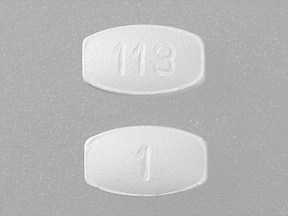Granisetron
Generic name: granisetron (oral) [ gra-NIS-e-tron ]
Dosage form: oral tablet (1 mg)
Drug class: 5HT3 receptor antagonists
What is granisetron?
Granisetron blocks the actions of chemicals in the body that can trigger nausea and vomiting.
Granisetron is used to prevent nausea and vomiting that may be caused by medicine to treat cancer (chemotherapy or radiation).
Granisetron may also be used for purposes not listed in this medication guide.
Granisetron side effects
Get emergency medical help if you have signs of an allergic reaction: hives; difficult breathing; swelling of your face, lips, tongue, or throat.
Granisetron may cause serious side effects. Call your doctor at once if you have:
-
headache with chest pain and severe dizziness, fainting, fast or pounding heartbeats;
-
increased blood pressure--severe headache, buzzing in your ears, anxiety, confusion, shortness of breath; or
-
high levels of serotonin in the body--agitation, hallucinations, fever, fast heart rate, overactive reflexes, nausea, vomiting, diarrhea, loss of coordination, fainting.
Common side effects of granisetron may include:
-
headache, weakness;
-
diarrhea, constipation;
-
stomach pain, indigestion, loss of appetite;
-
sleep problems (insomnia); or
-
fever, flu symptoms.
This is not a complete list of side effects and others may occur. Call your doctor for medical advice about side effects. You may report side effects to FDA at 1-800-FDA-1088.
Related/similar drugs
Warnings
Follow all directions on your medicine label and package. Tell each of your healthcare providers about all your medical conditions, allergies, and all medicines you use.
Before taking this medicine
You should not take granisetron if you are allergic to it.
To make sure granisetron is safe for you, tell your doctor if you have:
-
a heart rhythm disorder;
-
a personal or family history of long QT syndrome;
-
an electrolyte imbalance (such as low levels of potassium or magnesium in your blood); or
-
if you have recently had stomach or intestinal surgery.
It is not known whether granisetron will harm an unborn baby. Tell your doctor if you are pregnant.
It is not known whether granisetron passes into breast milk or if it could harm a nursing baby. Tell your doctor if you are breast-feeding a baby.
Granisetron is not approved for use by anyone younger than 18 years old.
How should I take granisetron?
Follow all directions on your prescription label. Do not take this medicine in larger or smaller amounts or for longer than recommended.
Granisetron is usually taken only on the day of treatment with chemotherapy or radiation.
Your doctor may want you to take only one dose, up to 1 hour before chemotherapy or radiation.
For patients undergoing chemotherapy, a second dose of granisetron is sometimes given 12 hours after the first dose. Follow your doctor's dosing instructions very carefully.
Do not share this medicine with another person.
Granisetron is not likely to be useful if you keep taking it during times when you are not receiving chemotherapy or radiation treatment.
Store at room temperature away from moisture, heat, and light.
What happens if I miss a dose?
Tell your doctor if you forget to take your dose within 1 hour before chemotherapy or radiation. Do not take extra medicine to make up the missed dose.
What happens if I overdose?
Seek emergency medical attention or call the Poison Help line at 1-800-222-1222.
What should I avoid while taking granisetron?
Follow your doctor's instructions about any restrictions on food, beverages, or activity.
What other drugs will affect granisetron?
Granisetron can cause a serious heart problem, especially if you use certain medicines at the same time, including antibiotics, antidepressants, heart rhythm medicine, antipsychotic medicines, and medicines to treat cancer, malaria, HIV or AIDS.
Taking granisetron together with certain other medicines can cause high levels of serotonin to build up in your body, a condition called "serotonin syndrome," which can be fatal. Tell your doctor if you also use:
-
lithium;
-
an antidepressant;
-
migraine headache medicine;
-
a narcotic (opioid) medication or muscle relaxer; or
-
other anti-nausea medications.
This list is not complete. Other drugs may interact with granisetron, including prescription and over-the-counter medicines, vitamins, and herbal products. Not all possible interactions are listed in this medication guide. Tell your doctor about all medicines you use, and those you start or stop using during your treatment with granisetron.
More about granisetron
- Check interactions
- Compare alternatives
- Pricing & coupons
- Reviews (21)
- Drug images
- Side effects
- Dosage information
- During pregnancy
- Drug class: 5HT3 receptor antagonists
- Breastfeeding
Patient resources
- Granisetron injection drug information
- Granisetron transdermal
- Granisetron (Intravenous) (Advanced Reading)
- Granisetron (Transdermal) (Advanced Reading)
- Granisetron Tablets
- Granisetron Extended-Release Injection
Other brands
Professional resources
Other brands
Related treatment guides
Further information
Remember, keep this and all other medicines out of the reach of children, never share your medicines with others, and use this medication only for the indication prescribed.
Always consult your healthcare provider to ensure the information displayed on this page applies to your personal circumstances.
Copyright 1996-2025 Cerner Multum, Inc. Version: 10.04.

